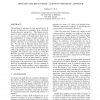Free Online Productivity Tools
i2Speak
i2Symbol
i2OCR
iTex2Img
iWeb2Print
iWeb2Shot
i2Type
iPdf2Split
iPdf2Merge
i2Bopomofo
i2Arabic
i2Style
i2Image
i2PDF
iLatex2Rtf
Sci2ools
113
click to vote
WSC
1997
1997
Selecting the Best System: A Decision-Theoretic Approach
The problem of selecting the best system from a finite set of alternatives is considered from a Bayesian decision-theoretic perspective. The framework presented is quite general, and permits selection from two or more systems, with replications that use either independent or common random numbers, with unknown mean and covariance for the output, and permits Gaussian or non-Gaussian simulation output. For the case of unknown means and variance with common random numbers, the framework provides a probability of correct selection that does not suffer from problems associated with the Bonferroni inequality. We indicate some criteria for which the Bayesian approach and other approaches are in general agreement, or disagreement. The probability of correct selection can be calculated either by quadrature or by Monte Carlo simulation from the posterior distribution of the parameters of the statistical distribution of the simulation output. We also comment on expected-value decision-making v...
Related Content
| Added | 01 Nov 2010 |
| Updated | 01 Nov 2010 |
| Type | Conference |
| Year | 1997 |
| Where | WSC |
| Authors | Stephen E. Chick |
Comments (0)

